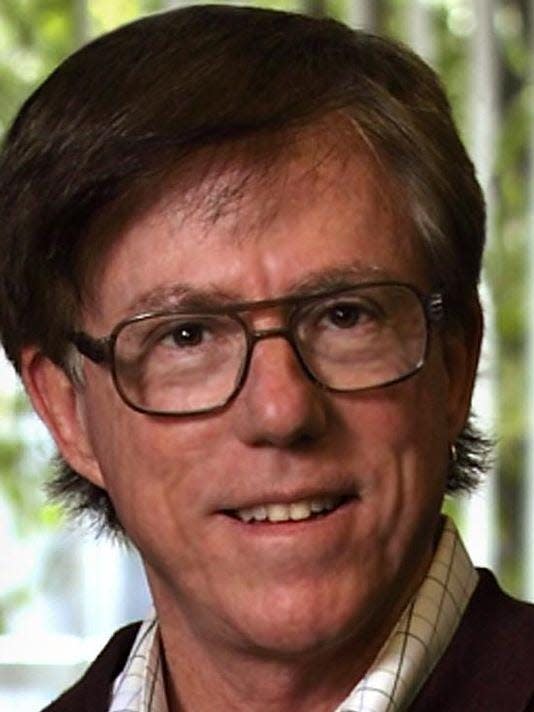A look back at the people and the views on the prairie

I grew up on the Midwest prairie, where the first European settlers planted hedge rows to fence in livestock, plows dug up the bluestem prairie grass followed by corn, wheat, soybeans, and hundreds of small towns flourished, some barely 12 or 15 miles apart.
My father made a fine living as an auctioneer and real estate agent helping the small farmers sell to the wealthy, who bulldozed the hedgerows and planted right up to the farm roads, building new houses and buying expensive machinery.
Today, corporate farms dot some of the prairie, and hundreds of giant windmills sprouted — called wind farms — generating energy to distant cities. Even though I've moved, I’m still haunted by the prairie's long vistas and gently rolling hills. But is reconstructing the past a fool's errand, a trick to avoid the present's pressing concerns?
The writer Joan Didion, who recently died, said, "We tell ourselves stories in order to live." Stories and even thoughts from the past might, mysteriously, be life-affirming, especially in troubled times.
For example, when I was about 12 I sought out the town atheist. Surely there were others, but this guy had established a quiet distinction as being approachable and kind, my parents told me, never thinking I might seek him out. I noticed he did not have fangs nor horns growing from his head.
"Are you an atheist?"
"Aren't you Lee Pulley's boy?"
"Yes."
"He's a fine man. Better listen to him."
I told him my dad was not an atheist, and the conversation ended. I wanted to hear more, but nothing doing. Telling myself that story today makes me wonder if I internalized the goodness of those two men, their shared respect, in spite of differences. A story I might apply today.
One early Sunday morning while delivering newspapers on my bicycle, I saw a man I knew sprawled on his front steps, obviously passed out drunk. He was a carpenter whose shop I'd passed several times, often stopping in, watching him measure accurately before sawing. I called his name, and he moved slightly. I pedaled off, not wanting him to know I saw him, a respectable man in that condition.
As a kid, what was I to learn from encountering atheists and drunks? And according to Joan Didion, by telling their stories am I doing it "in order to live?" The atheist and drunk still reside clearly in my mind. What's their value now?
Since leaving the prairie, why do I continue telling story after story about the place? Is it for some kind of psychic cleansing that only my psychotherapist and I discuss?
And what about that atheist? Do I remember him because of my many crises of faith, some of which still exist and about which I often struggle? Do I reside somewhere between my father's theism and the atheist's non-belief? And what about the carpenter passed out on his porch steps? Do I still recall that scene because — even though I've never passed out on my front steps — I hope my drinking never gets out of hand? That I might remain under control?
Our past landscapes could have shaped us. Densely wooded locales, mountains. I prefer flat distances, the freedom to see, to think openly, not be encumbered, wondering about all the stories that took place on flat land from which I might, if fortunate, gain some insight about myself today.
Even though I've moved many times, perhaps I'll always be a prairie child. A product of that landscape and its people. Whether I want to be or not.
Michael Pulley lives in Springfield. He can be reached at mpulley634@gmail.com.
This article originally appeared on Springfield News-Leader: A look back at the people and the views on the prairie
